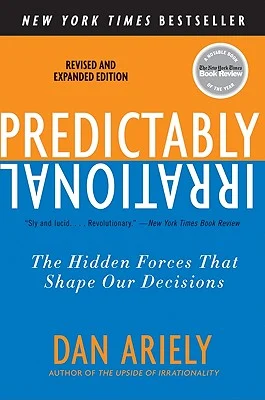Dan Ariely’s Predictably Irrational makes you laugh at human behavior while also leaving you baffled that we ever managed skyscrapers or rocket launches. The main point is clear: people rarely make decisions like calculators. Choices get nudged, tricked, and distracted by illusions. Marketers, teachers, and politicians know this well. Ariely simply adds the science.
A Libertarian perspective makes the book both fun and frustrating. Fun comes from spotting the traps people fall into, like buying the “combo deal” that is just the expensive item with a freebie stapled on. Frustration comes when politics uses the same tricks, and sound ideas lose to cheap illusions. Voters act irrationally in predictable ways. Recognizing the pattern allows Libertarians to design smarter ballot access campaigns, recruit better candidates, and reach independent voters.
Ballot access in Ohio illustrates Ariely’s point. Rules are confusing and stacked against third parties. You might think voters would rally to fix the unfairness. Ariely’s research shows people often accept rigged systems if they feel normal. That explains why so many shrug at ballot access barriers. Resignation becomes the predictable irrationality. Libertarians need to flip the script by framing ballot access as an obvious absurdity. Instead of saying “we need 60,000 signatures,” it works better to make the process feel like a ridiculous game show obstacle course. Humor and outrage together can break through resignation.
Candidate recruiting also fits Ariely’s model. People avoid running for office not through careful math but through fear, social comparison, and procrastination. His research shows we stick with the “default option,” even when better choices exist. For Libertarians, the default is sitting out. Changing that requires making candidacy feel like the easy choice. Simple starter kits, mentors for new candidates, and public celebration of small first steps can shift the default toward participation.
Independent voters show another Ariely principle. People rarely know what they want until comparing options. Coke and Pepsi ads survive because of this quirk. Libertarians lose when they remain invisible in the Coke vs Pepsi fight. A better strategy is becoming the craft soda on the shelf with a clear flavor profile. Independents like having choices but also need to see others trying them. Success stories, relatable examples, and peer validation matter more than policy charts.
The main lesson for Ohio Libertarians is straightforward. Spreadsheets and charts cannot argue people into freedom. Human thinking comes with quirks and blind spots that require a different approach. Signature drives must feel fun and righteous. Candidate recruiting must feel like the natural choice. Voter outreach must lean on comparisons and stories, not abstractions.
Ariely is not a Libertarian writer, yet his work is a practical toolbox for anyone fighting human stubbornness. Ohio Libertarians who read him closely can move past asking “why don’t people get it?” and start asking “how do we work with the way people really decide?” That mental shift could mean the difference between remaining a political footnote or becoming a real force.
Check it out on Amazon: https://www.amazon.com/Predictably-Irrational-Revised-Expanded-Decisions/dp/0061353248/

